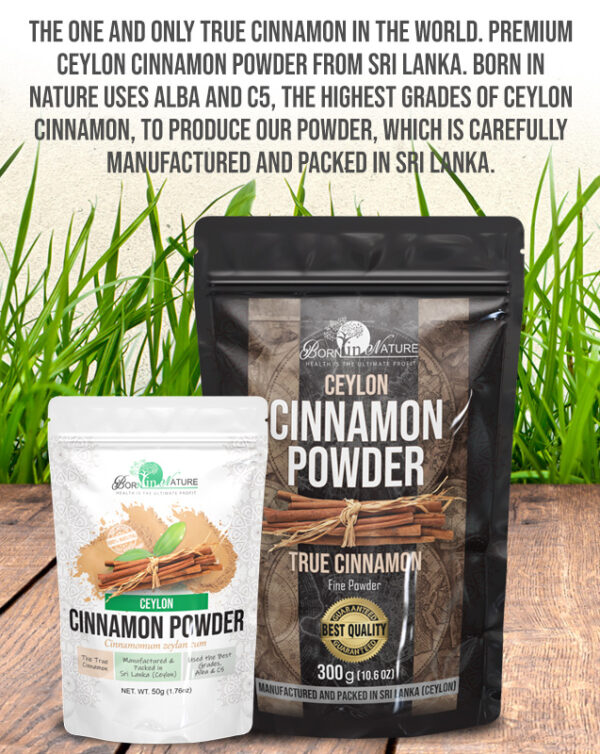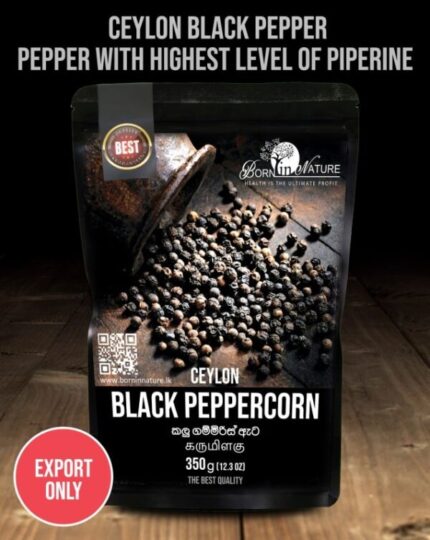Cinnamon from Ceylon, commonly referred to as “True Cinnamon”, is a variety of cinnamon that is native to the island nation of Sri Lanka. In comparison to the more common cassia kind, it is considered to be among the highest quality cinnamon found anywhere in the globe. In its long history, Sri Lanka (formerly known as Ceylon) has been subject to some severe foreign invasions, the primary motivation for which was to seize control of the cinnamon trade in Ceylon.
The production of cinnamon from Ceylon is a labor-intensive process, and certain phases require personnel who are skilled and trained.
In comparison to cassia, it has a more delicate, luxurious, and sweet flavor as well as a different texture and odor. In addition, cinnamon from Ceylon is loaded with beneficial elements and has an exceptionally low amount of the cancer-causing coumarin that cassia does to a significant degree.
In contrast to standard cinnamon powders, the powder that we produce at Born in Nature is made from the highest cinnamon grades available, such as C5 and Alba quills. As a result, it may be more expensive than the standard Ceylon Cinnamon powders that are available on the market; nonetheless, the quality of the powder is unrivaled.
MOQ: 5kg
Appearance: Light brown color fine powder with a reddish tint (100 mesh).
Flavour: Delicate, sweet and slightly woody taste. It is considered less pungent than other types of cinnamon.
Odor: Ceylon cinnamon has a warm and sweet aroma, with a hint of clove and citrus.
Packaging: Corrugated carton with inner alufoil bag
Preservatives/Additives: No
Shelf life: 2 years
Storage conditions: Should be kept in a clean, dry place at room temperature.
Ceylon cinnamon powder is believed to have many potential health benefits. Some of the most well-known benefits include:
Anti-inflammatory properties: Cinnamon contains compounds called cinnamaldehyde and cinnamic acid, which have anti-inflammatory effects on the body.
Antioxidant properties: Ceylon cinnamon is a rich source of antioxidants, which can help protect the body against damage caused by harmful molecules called free radicals.
Blood sugar control: Cinnamon help improve insulin sensitivity and lower blood sugar levels, which makes it potentially useful for people with diabetes.
Heart health: Some studies have suggested that regular consumption of cinnamon can lower cholesterol levels and reduce the risk of heart disease.
Brain function: Cinnamon has been found to improve cognitive function and memory in some studies.
Anti-cancer properties: Some laboratory studies have suggested that cinnamon may have anti-cancer properties.
Born in Nature Ceylon Cinnamon powder can be used in a wide range of culinary and non-culinary applications. Some common uses include:
Cooking: Ceylon cinnamon powder is a popular spice used in cooking and baking. It is often used to flavor sweet and savory dishes, such as pies, cakes, curries, stews, and marinades.
Ingredient of Food Processing: It is widely used in cereal bars, breakfast cereals, oatmeal, cookies and snacks as an ingredient.
Beverages: Ceylon cinnamon powder is a common ingredient in hot drinks such as tea and coffee, as well as in cold drinks like smoothies and lattes.
Desserts: Ceylon cinnamon powder is used in a variety of desserts, including cakes, cookies, and pastries.
Meat dishes: Ceylon cinnamon powder is often used to flavor meat dishes, such as stews, curries, and marinades.
Health supplements: Born in Nature Cinnamon powder can be used for encapsulation due to its exceptional quality and also as an ingredient of health supplements.
Toiletries and cosmetics: Ceylon cinnamon powder can be used as a natural ingredient in soaps, lotions, scrubs, and other toiletries, due to its anti-bacterial and anti-fungal properties.
Difference between Ceylon Cinnamon & Cassia
Ceylon cinnamon and cassia are produced from completely different types of trees and have distinct differences in health and nutritional content even though they are somewhat similar in organoleptic characteristics.
Flavor & appearance difference: Ceylon cinnamon is considered to be milder and sweeter, while cassia cinnamon is considered to be stronger and more pungent. Ceylon cinnamon is lighter in color, thinner in bark and the layers of the bark can be easily separated. Cassia cinnamon is thicker, harder and generally darker.
Another difference is in the nutritional content: Ceylon cinnamon is lower in coumarin, a natural substance that can act as a blood thinner, while Cassia cinnamon is relatively high in coumarin. This means that excessive consumption of Cassia cinnamon can cause toxicity and harm to the liver.
Ceylon cinnamon is considered to be a more premium product and is more expensive than cassia cinnamon.
Ceylon cinnamon is used primarily in sweet dishes and as an addition to light-colored dishes, as it does not affect the color of the dish, whereas Cassia cinnamon is often used in savory dishes and darker colored dishes due to its darker color.
In summary, Ceylon cinnamon is considered to be the true higher-quality cinnamon, whereas Cassia is commonly available substitute due to its similarities of flavor profiles, and should be consumed in moderation due to harmful substances in it.
FAQ
- What is Ceylon cinnamon and why is it called “true cinnamon”?
Ceylon Cinnamon, often referred to as “True Cinnamon,” is a premium spice native to Sri Lanka. Renowned for its sweet, delicate flavor and warm aroma, it stands apart from the more common Cassia variety. One of the key reasons it’s called “True Cinnamon” is its purity and low coumarin content—a naturally occurring compound that can be harmful in large doses. This makes Ceylon Cinnamon a safer and healthier choice for daily use in cooking, baking, and wellness routines.
Choose Ceylon Cinnamon (Cinnamomum verum) for authentic flavor, superior quality, and unmatched health benefits.
- Where is Ceylon cinnamon grown in Sri Lanka?
Ceylon Cinnamon is primarily grown in the fertile southern regions of Sri Lanka, where the tropical climate and rich soil create ideal conditions for cinnamon cultivation. The most renowned areas include Galle, Matara, and Ratnapura—regions internationally recognized for producing the highest-quality Ceylon Cinnamon in the world.
Our cinnamon is responsibly sourced from these areas to ensure you receive only the purest and most aromatic True Cinnamon, straight from its native home.
- What makes Ceylon cinnamon from Sri Lanka unique?
Ceylon Cinnamon from Sri Lanka stands out for its exceptional quality, aroma, and craftsmanship. Unlike Cassia, Sri Lankan cinnamon is hand-rolled into thin, elegant quills, giving it a soft texture and ultra-smooth finish. It features a lighter golden-brown color, delicate bark, and a sweet, floral fragrance that sets it apart from all other cinnamon types.
Known as the gold standard of cinnamon, Ceylon Cinnamon is not only prized for its flavor but also for its purity and low coumarin content, making it the preferred choice for health-conscious consumers and gourmet chefs alike.
- What is the history of Ceylon cinnamon in Sri Lankan trade?
Ceylon Cinnamon has played a legendary role in Sri Lanka’s spice trade history for centuries. Revered as one of the world’s most valuable spices, it attracted global attention as early as ancient times. Arab traders were among the first to export it, followed by colonial powers like the Portuguese, Dutch, and British, who sought control over Sri Lanka largely due to its abundant cinnamon.
As the original home of True Cinnamon, Sri Lanka became the global cinnamon capital—a title it proudly holds to this day, continuing to supply the world with the most authentic and premium-grade cinnamon.
- How does Ceylon cinnamon compare to cassia?
The difference between Ceylon Cinnamon and Cassia is significant in both quality and safety. Ceylon Cinnamon is known for its soft texture, sweet, subtle flavor, and light, flaky bark, making it ideal for everyday use in food and beverages. In contrast, Cassia cinnamon—commonly found in supermarkets—is thicker, harder, darker in color, and has a more pungent, overpowering taste.
Most importantly, Cassia contains high levels of coumarin, a compound that may pose health risks when consumed regularly. Ceylon Cinnamon, with its low coumarin content, is the safer and healthier choice for long-term consumption.
- How to identify genuine Ceylon cinnamon?
Authentic Ceylon Cinnamon is easy to spot when you know what to look for. It has thin, multi-layered quills that resemble a rolled cigar, a hallmark of its traditional hand-rolling process. The bark is soft and fragile, breaking easily with light pressure.
Another key indicator is its delicate citrus-like aroma—subtle, sweet, and never overpowering. Unlike the hard, dark, and thick bark of Cassia, True Ceylon Cinnamon is light brown in color, finely textured, and beautifully fragrant.
Look for these signs to ensure you’re getting pure, unadulterated Ceylon Cinnamon.
- What are the grades of Ceylon cinnamon?
Ceylon cinnamon, also known as True Cinnamon (Cinnamomum verum), is a globally admired spice native to Sri Lanka. But did you know that Ceylon cinnamon is available in many different grades?
These grades determine the quality, size, aroma, appearance, and price of the cinnamon quills and are classified by the Sri Lanka Standards Institute (SLS 81).
Main categories of Ceylon cinnamon grades
| Category | Grade Names | Diameter/Quality |
| Alba | Alba | Finest, < 6 mm diameter |
| Continental | C5 Special, C5, C4, C3 | 6–16 mm (High quality export grade) |
| Mexican | M5, M4, M3 | 16–21+ mm (Thicker, less refined) |
| Hamburg | H1, H2, H3 | Coarser grades, mostly for powder |
Alba grade – The finest Cinnamon in the world
Diameter: Less than 6 mm
Color: Golden, smooth surface
Flavor: Sweet, mild, and aromatic
Uses: Premium foods, specialty teas, gifts
Price: Highest among all grades
Fun fact: Alba grade is so rare that only a small percentage of cinnamon production in Sri Lanka qualifies!
Continental grades – Popular for export
| Grade | Diameter | Notes |
| C5 Special | < 10 mm | Smooth, fragrant, premium quality |
| C5 | < 11 mm | Balanced flavor and thickness |
| C4 | 11–13 mm | Most demanded grade internationally |
| C3 | 13–16 mm | Slightly thicker, still aromatic |
Mexican grades – For bulk and blended use
| Grade | Diameter | Use Case |
| M5 | 16–18 mm | Food service, blended spices |
| M4 | 18–21 mm | Lower cost applications |
| M3 | >21 mm | Usually for cinnamon powder |
Hamburg grades – Economical and industrial use
| Grade | Description |
| H1 | Coarse quills, mixed sizes |
| H2 | Bark pieces and inner curls |
| H3 | Chips, bark fragments, lowest in quality |
What about cinnamon quillings, chips and powder?
In addition to stick grades, Ceylon cinnamon is available in:
– Quillings: Small broken pieces of quills
– Featherings: Inner bark from small branches
– Chips: Bark fragments from larger branches
– Powder: Ground cinnamon made from various grades
Final thoughts: Which grade is right for you?
– Alba or C5 Special: If you’re a gourmet brand or high-end health product seller
– C4 or C3: For quality at a competitive price
– Mexican or Hamburg: If you’re buying for bulk spice mixes or cinnamon powder
Contact us
Ready to source premium Ceylon cinnamon directly from Sri Lanka?
Contact us today for bulk orders, pricing, and samples!
- What does premium Ceylon cinnamon smell and taste like?
Premium Ceylon Cinnamon is cherished for its delicate, sweet-spicy aroma enriched with subtle floral and citrus undertones. Unlike Cassia, its scent is light and soothing—not harsh or pungent.
The flavor is mild, warm, and pleasantly smooth, making it perfect for both sweet and savory dishes. It adds depth without overpowering other ingredients, which is why Ceylon Cinnamon is the top choice for gourmet cooking and wellness blends.
- How is Ceylon cinnamon harvested in Sri Lanka?
Ceylon Cinnamon harvesting is a centuries-old artisan craft unique to Sri Lanka. Skilled cinnamon peelers carefully strip the inner bark of young cinnamon stems by hand, using traditional tools and techniques passed down through generations.
The delicate bark is then rolled into tight, cigar-shaped quills and sun-dried naturally, a process that helps preserve its rich aroma, essential oils, and golden color. This meticulous handcrafting is what gives Ceylon Cinnamon its signature soft texture, refined taste, and superior quality.
- What parts of the tree are used to make Ceylon cinnamon powder?
Ceylon Cinnamon powder is carefully made from the inner bark of the Cinnamomum verum tree. Only this delicate inner layer is used, ensuring the powder’s 100% purity and authentic flavor.
No outer bark, stems, or fillers are included, which helps maintain the cinnamon’s fine texture, light color, and true aromatic profile that distinguishes it from inferior varieties.
- How is Ceylon cinnamon powder made?
Ceylon Cinnamon powder is produced by gently grinding the dried cinnamon quills into a fine powder. We, Born in Nature, use Alba and C5 grades, which are the highest grades of Ceylon cinnamon, to make our powder.
The process avoids using high heat, which helps preserve the essential oils, flavor compounds, and natural health benefits inherent in the bark. This careful method ensures that the powder retains its delicate aroma, rich taste, and therapeutic properties, making it perfect for culinary and wellness uses.
Our powder is sulphur-free and microbiologically safe.
- How to use Ceylon cinnamon powder in cooking?
Ceylon Cinnamon powder is a versatile spice that enhances both sweet and savory dishes. Its mild, balanced flavor makes it perfect for adding to curries, baked goods, porridge, smoothies, teas, and even coffee.
Unlike Cassia, its subtle taste doesn’t overpower your recipes—it gently elevates them with a warm, sweet-spicy aroma. Whether you’re baking cinnamon rolls or simmering a curry, a pinch of True Ceylon Cinnamon brings depth and authenticity to every dish.
- What are the best recipes for Ceylon cinnamon tea?
Making Ceylon Cinnamon tea is simple, soothing, and packed with health benefits. For a traditional brew, boil 1 teaspoon of Ceylon Cinnamon powder or 1 cinnamon stick in water for 5–10 minutes. Add Ceylon black tea leaves for a richer flavor, then finish with a touch of honey or a splash of lemon juice.
This warming tea is not only delicious but also known for its detoxifying and digestion-supporting properties—perfect for daily wellness.
- Can you use Ceylon cinnamon in baking?
Absolutely! Ceylon Cinnamon is a baker’s favorite thanks to its smooth, sweet, and mild flavor. It’s perfect for recipes like cinnamon rolls, cookies, cakes, muffins, banana bread, and more. Unlike Cassia, it delivers all the warmth and aroma without any bitterness or harsh aftertaste.
Whether you’re baking for health or indulgence, True Ceylon Cinnamon adds a touch of elegance and authenticity to every bite.
- How to add cinnamon to smoothies and breakfasts?
Adding Ceylon Cinnamon to your morning routine is a delicious way to boost both flavor and nutrition. Simply sprinkle ¼ teaspoon into your oatmeal, yogurt, granola, or fruit bowls for a warm, aromatic touch.
You can also blend it into smoothies or protein shakes to enhance taste while benefiting from its natural antioxidants and anti-inflammatory properties. It’s an easy, healthy upgrade to your everyday breakfast.
- How to store Ceylon cinnamon for maximum freshness?
To maintain the aroma, flavor, and potency of your Ceylon Cinnamon, store it in an airtight glass container, away from direct sunlight, heat, and moisture.
Keep it in a cool, dry place—not near the stove or refrigerator. With proper storage, Ceylon Cinnamon powder or quills can stay fresh and aromatic for 18 months or longer, ensuring every use is as flavorful as the first.
- What is the shelf life of Ceylon cinnamon?
When stored properly in a cool, dry place, away from light and moisture, both Ceylon Cinnamon sticks and powder can retain their quality for up to 2 years.
Our premium packaging is designed to lock in freshness and protect the natural aroma and essential oils, ensuring minimal loss of flavor and maximum shelf life. For best results, always reseal the container tightly after each use.
- What are the health benefits of Ceylon cinnamon?
Ceylon Cinnamon is more than just a flavorful spice—it’s packed with powerful health benefits. Known for its anti-inflammatory and antioxidant properties, it can help reduce oxidative stress and support overall well-being.
Studies suggest that Ceylon Cinnamon may aid in lowering blood sugar levels, improving insulin sensitivity, and promoting heart health. It’s also believed to support digestion and boost metabolism, making it a popular addition to wellness routines and natural remedies.
- Is Ceylon cinnamon safe for daily use?
Absolutely yes! Ceylon Cinnamon is considered safe for daily consumption thanks to its very low coumarin content, a natural compound that can be harmful. Unlike Cassia cinnamon, which contains high levels of coumarin, True Ceylon Cinnamon offers a safer option for long-term use.
Enjoy it daily in your tea, cooking, or wellness routine—guilt-free and worry-free—as part of a healthy lifestyle.
- What is the recommended daily intake of Ceylon cinnamon?
For most adults, a daily intake of ½ to 1 teaspoon of Ceylon Cinnamon powder is considered safe and effective. This amount is enough to enjoy its health benefits, such as improved blood sugar control and antioxidant support, without any risk of coumarin-related side effects.
As always, it’s best to consult a healthcare professional if you have any medical conditions or are taking medications.
- Are there any side effects of overusing cinnamon?
Ceylon Cinnamon is naturally low in coumarin, making it much safer than Cassia for regular use. However, like any spice or supplement, it’s important to use it in moderation. Exceeding the recommended daily amount (about 1 teaspoon per day) may not offer additional benefits and could cause mild digestive discomfort in sensitive individuals.
For best results, stick to safe, consistent usage as part of a balanced diet.
- Where can I buy authentic Ceylon cinnamon online?
You can purchase 100% authentic Ceylon Cinnamon right here at Born in Nature (Pvt) Ltd. We source directly from trusted farms in Sri Lanka, the true home of Ceylon Cinnamon, and guarantee products that are pure, hand-processed, and free from additives or fillers.
Shop confidently with us for premium-grade Ceylon Cinnamon sticks and powder, delivered straight to your door.
- How to ensure you’re buying true Ceylon cinnamon?
When shopping for cinnamon, always look for products that are genuinely sourced, manufactured, and packed in Sri Lanka (Ceylon). True Ceylon cinnamon is rarely adulterated when it originates entirely from its native land.
Unlike cheaper, mass-produced varieties, Ceylon cinnamon (Cinnamomum verum or Cinnamomum zeylanicum) is a premium spice known for its delicate aroma, soft and flaky sticks, and light golden-brown powder. The harvesting process is highly labor-intensive, which is why authentic Ceylon cinnamon is never inexpensive.
How to Identify True Ceylon Cinnamon:
- Look for the botanical names: Cinnamomum verum or Cinnamomum zeylanicum
- Check for soft, multi-layered, flaky quills
- Choose powder that is light in color—not dark brown
- Avoid hard, thick bark, which is typical of cassia or adulterated cinnamon
Choose wisely. Choose Ceylon cinnamon—the world’s finest and healthiest cinnamon.
- Which is better: Ceylon cinnamon sticks or powder?
Both Ceylon Cinnamon sticks and powder offer the same health benefits—rich in antioxidants, low in coumarin, and full of natural flavor. The best choice depends on how you intend to use them.
- Cinnamon sticks are ideal for slow infusions like teas, stews, curries, and mulled drinks, where they release their aroma gradually.
- Cinnamon powder is perfect for quick use in baking, smoothies, oatmeal, coffee, and everyday cooking.
For maximum versatility in your kitchen and wellness routine, it’s best to keep both forms of True Ceylon Cinnamon on hand.
- Which countries grow cinnamon other than Sri Lanka?
Besides Sri Lanka, cinnamon is cultivated in several other countries, including Indonesia, China, Vietnam, and India. However, these countries primarily produce Cassia cinnamon, which is thicker, darker, and less delicate compared to the true Ceylon cinnamon native to Sri Lanka.
While Cassia is more common and often less expensive, it lacks the refined flavor and low coumarin content that make Ceylon Cinnamon the premium choice worldwide.
- What is the difference between Ceylon cinnamon and Indonesian cassia?
Indonesian Cassia is characterized by its darker color, thicker bark, and a stronger, more pungent flavor. It tends to have a harsher taste and higher coumarin content compared to Ceylon cinnamon.
In contrast, Ceylon Cinnamon is lighter in color, thinner, and sweeter, with a delicate aroma and smooth texture. It’s easier to grind and is the preferred choice for gourmet cooking and health-conscious consumers seeking quality and safety.
- How does Vietnamese cinnamon (Saigon) compare to Ceylon cinnamon?
Vietnamese Cinnamon (Saigon) is known for its intensely spicy flavor and high coumarin content, which can pose health risks if consumed regularly in large amounts. It has a bold, robust aroma favored in some culinary uses, but is less suitable for daily consumption.
On the other hand, Ceylon Cinnamon offers a smooth, mild taste with a delicate aroma and contains much lower levels of coumarin, making it a safer and healthier option for everyday use in cooking and wellness routines.
- Why is Ceylon cinnamon considered superior to other types?
Often called “True Cinnamon,” Ceylon Cinnamon is prized for its refined, delicate flavor and exceptionally low coumarin levels, making it safer for regular consumption compared to other varieties like Cassia.
Additionally, it is harvested using traditional, eco-friendly methods unique to Sri Lanka, ensuring superior quality, authenticity, and sustainability. These factors combined make Ceylon Cinnamon the gold standard among cinnamon types worldwide.
- Is cassia cinnamon dangerous for health compared to Ceylon cinnamon?
Yes. Cassia cinnamon contains high levels of coumarin, a natural compound that can be toxic to the liver when consumed in large amounts over time. This makes Cassia less safe for daily or long-term use.
In contrast, Ceylon Cinnamon has very low coumarin content, making it a much safer and healthier option for everyday consumption, especially for those mindful of their liver health and overall wellness.
- Is cinnamon adulterated in the market?
Unfortunately, yes. Many commercial cinnamon products are adulterated by blending Cassia with Ceylon cinnamon or by adding colorants, fillers, and artificial oils to reduce costs. Such practices compromise the quality, flavor, and safety of the cinnamon.
To ensure you receive authentic cinnamon, always check the product label, verify the country of origin, and purchase from trusted suppliers who guarantee 100% pure Ceylon Cinnamon.
- How can you detect fake or adulterated cinnamon powder?
Fake or adulterated cinnamon powder often has a strong spicy odor and taste, and a gritty texture. Quickly get sedimented in water. In contrast, pure Ceylon Cinnamon powder is smooth, fragrant, and combines with water smoothly.
To ensure authenticity, always buy from trusted sources and perform simple tests like the water test or aroma check before use.
- Why is Ceylon cinnamon more expensive than cassia?
Ceylon Cinnamon commands a higher price because it requires labour-intensive harvesting and is hand-processed with care. It grows exclusively in Sri Lanka’s unique climate, making it a rare and premium spice.
Its superior quality, safety, and purity, combined with traditional artisanal methods, justify its premium price compared to the more common, mass-produced Cassia cinnamon.
- Can Ceylon cinnamon be mixed with cassia and sold as pure?
Unfortunately, yes. Some unethical sellers mix Cassia cinnamon with Ceylon cinnamon and market it as pure, compromising quality and safety.
To avoid this, always try to buy from verified suppliers directly from Sri Lanka.








Reviews
There are no reviews yet.